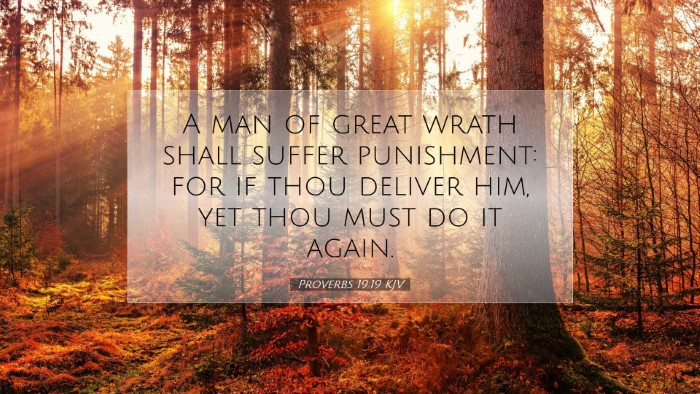Commentary on Proverbs 19:19
Proverbs 19:19 states: "A man of great wrath shall suffer punishment: for if thou deliver him, yet thou must do it again." This verse offers profound insights into the nature of anger and the consequences that accompany it. Various public domain commentaries provide valuable perspectives that help to illuminate the meaning of this scripture.
Insights from Matthew Henry
Matthew Henry emphasizes that a person characterized by great wrath, or uncontrolled anger, is inherently destructive. He suggests that such a man often faces dire consequences, not only due to his outbursts but also because of the social ramifications that accompany a quick temper. Anger can lead to conflict, estrangement, and even punishment, illustrating the ripple effect of emotional instability on both the individual and the community.
Henry points out that the phrase "shall suffer punishment" implies that the person may face legal or social repercussions. Furthermore, the latter part of the verse stresses that even if someone attempts to help or save the angered individual, the cycle of anger may repeat itself: "yet thou must do it again." This highlights the futility and frustration often associated with trying to assist those unwilling to control their anger.
Insights from Albert Barnes
Albert Barnes adds another layer of understanding to this proverb by analyzing the word "wrath." He defines wrath as more than just a passing emotion; it indicates a deep-seated disposition that can lead to habitual destructive behavior. Barnes warns that such a person not only harms others but also endangers themselves, setting into motion a chain of destructive events that often ends in regret.
In Barnes's view, the verse serves as both a warning and an encouragement. It warns potential victims of anger to tread carefully, as engaging with an ill-tempered individual can lead to their own suffering. On the other hand, it also encourages people to seek emotional resilience and self-control, to rise above the provocations that lead to wrath.
Insights from Adam Clarke
Adam Clarke provides an interpretive commentary focused on the psychological aspects of anger. He notes that the biblical perspective on wrath serves as a reminder of the Lord’s disapproval of unrestrained tempers. Clarke elaborates on the consequences of anger, stating that a man of wrath frequently creates chaos around him, impacting not just his relationships, but also his spiritual life and connection with God.
Clarke emphasizes the necessity of humility and patience in dealing with anger. The proverb suggests that even when someone intervenes to help an angry person, the underlying issue of uncontrolled wrath may lead to repeated instances of conflict — as captured in "yet thou must do it again." Clarke's commentary thus suggests that it’s more beneficial for individuals to cultivate peace and patience than to confront a person caught in the throes of anger again and again.
Theological Reflections
This verse encompasses deep theological truths regarding human nature and the fallibility of man. It reveals that anger can be a form of idolatry when it takes precedence over patience and self-control, which are fruits of the Spirit as documented in Galatians 5:22-23. The cycle of wrath leads to isolation and punishment, not only socially but spiritually.
Practical Applications for Pastors and Theologians
- Understanding Anger: This verse emphasizes the need for pastors to educate their congregations about the destructive nature of unchecked anger and provide biblical methods for addressing conflict in a godly manner.
- Promoting Emotional Health: Church leaders can develop programs that emphasize emotional health and the importance of self-control, thereby helping individuals break free from cycles of anger.
- Counseling Approaches: The insights from these commentaries can aid those in pastoral counseling environments. Understanding the implications of wrath can guide leaders in challenging the narrative surrounding anger and offering paths to repentance and restoration.
- Encouraging Forgiveness: Highlight the importance of forgiveness and reconciliation in healing relationships that may be marred by anger.
- Building Community: Encourage congregants to engage in discussions about anger management and mental well-being, fostering a community committed to supporting one another in emotional and spiritual growth.
Conclusion
In conclusion, Proverbs 19:19 serves as a practical guide for navigating the complexities of human emotions, specifically anger. The insights drawn from respected commentaries illustrate that unchecked wrath produces dire consequences, not only for the individual but also for those who interact with them. By applying these teachings, individuals can cultivate a more harmonious life, characterized by patience and self-control, aligning with the biblical call to live in peace with one another.


